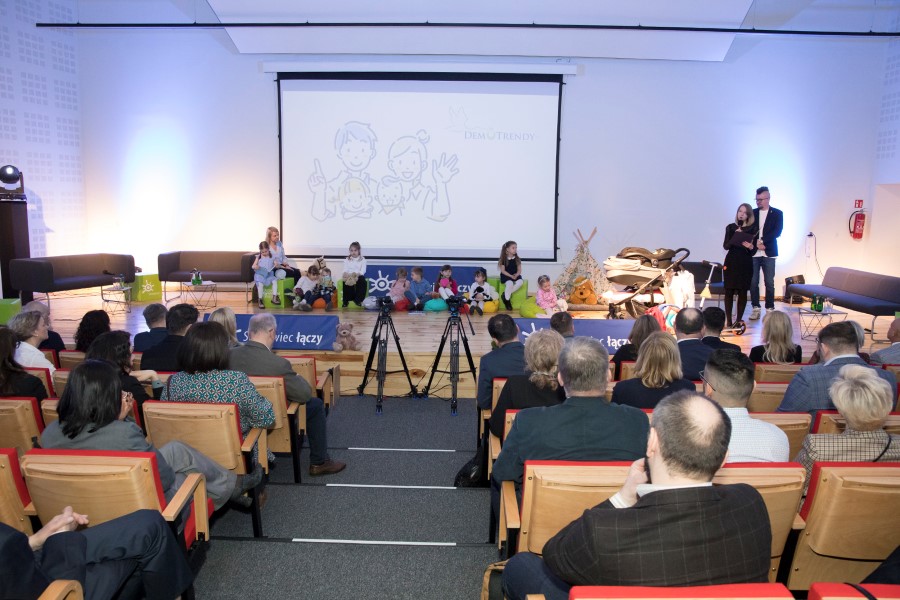On 24 March 2025, the ‘DemoTrendy 2025’ (‘DemoTrends 2025’) conference organised by the City of Sosnowiec took place at the Zagłębiowska Mediateka in Sosnowiec. The topic of the meeting was the demographic changes taking place in Sosnowiec. The event was attended by representatives of the University of Silesia in Katowice: Agnieszka Turska-Kawa, PhD, DSc, Assoc. Prof., Vice-Rector for Research and academics who, commissioned by the City of Sosnowiec, conducted research entitled ‘Conditions of demographic trends in Sosnowiec’. The city authorities were represented by Arkadiusz Chęciński, Mayor of Sosnowiec and Anna Jedynak-Rykała, Chair of the City Council. Metropolis GZM was represented by Kazimierz Karolczak, Chair of the Board.
The head of the research team is Sławomir Sitek, PhD, DSc from the Institute of Social and Economic Geography and Spatial Management. The conducted work included three segments: analysis of existing data from the Central Statistical Office (GUS), qualitative research in the form of group interviews (focus groups) and quantitative research in the form of a survey among secondary school students.
During the meeting, synthetic research results were presented, which were included in three reports:
‘The demographic situation of Sosnowiec’ – the report was prepared by socio-economic geographers from the Institute of Social and Economic Geography and Spatial Management (Sławomir Sitek, PhD, DSc, Sławomir Pytel, PhD, DSc, Assoc. Prof., Elżbieta Zuzańska-Żyśko, PhD, DSc, Assoc. Prof.). The study identifies the demographic processes taking place in Sosnowiec since 1950 and presents the Central Statistical Office forecast regarding the directions of further population changes in the perspective of 2060. The analyses undertaken allowed for the determination of the scale, pace and direction of changes, indicating the ongoing demographic trends and the factors shaping them. They show that the city will continue to be subject to depopulation processes, which, according to the Central Statistical Office forecast, will reduce the demographic potential from the current level of 186,000 to 114,000 inhabitants in 2060, i.e. by -39%. Particular attention was paid to changes in fertility patterns, which resulted in reduced fertility, a shift in the age at which women have children, and an increasing share of extramarital births. Currently, the highest fertility is observed among women aged 30–34, and the fertility rate in 2023 has decreased to 0.98. These changes are typical of the phase of the second demographic transition.
‘Living conditions in Sosnowiec’ – the report was prepared by sociologists from the Institute of Sociology (Rafał Muster, PhD, DSc, Assoc. Prof., Agata Zygmunt-Ziemianek, PhD). The aim of the study was to identify the factors determining the demographic situation of Sosnowiec and their consequences for the city. The study was exploratory in nature and aimed to identify the problem taking into account the perspective of various groups of respondents. Four focus group interviews were conducted, respectively with institutional experts from the Sosnowiec area, Sosnowiec residents aged 18–49, adult secondary school students and university students living in Sosnowiec. The discussions touched on the assessment of living conditions in the city, opinions on the support provided to residents by the city, and also young people’s life plans related to Sosnowiec. The general assessment of the changes taking place in the city formulated by the inhabitants of Sosnowiec is positive. They appreciate the numerous investments in infrastructure, while at the same time emphasising the need for greater efforts to be put into spatial order in Sosnowiec. The city’s problem indicated by all groups is the poor offer on the job market.
‘Life plans of secondary school students in Sosnowiec’ – the report was prepared by political scientists from the Institute of Political Science (Maciej Marmola, PhD, Agata Olszanecka-Marmola, PhD). The primary objective of the study was to determine the life, educational and professional plans of final-year students of selected secondary schools located in Sosnowiec, as well as the perception of the city among this group of young adults. The survey also asked about the emotional connection with Sosnowiec and the reasons for moving to and leaving the city. The survey was conducted on a sample of 479 students. It turns out that although the surveyed secondary school students positively evaluate Sosnowiec in many aspects, most of them do not intend to link their future with this city. A common reason for such decisions is the desire to explore new places. Research shows that women are less likely to associate their future with Sosnowiec. They evaluate the city worse, demonstrate weaker ties with it, and declare a greater propensity to migrate. From the point of view of fertility, the declaration that women are more likely than men to not make life fulfilment dependent on having children is also important. About 30% of women surveyed indicated that having a child is not necessary to achieve life satisfaction.
During the conference, city representatives presented numerous ideas aimed at counteracting further depopulation. These included proposals to create new places in nurseries, family-friendly changes in maternity wards, free hours for children’s stay in kindergartens and a birthday lottery in which parents of newborn children will be able to win money or a council flat.
The conference is an example of good cooperation between universities and local government. This also proves the usefulness of the research being conducted, which can provide knowledge about the processes taking place and thus support the city authorities in developing remedial actions.
Materials of the Sosnowiec City Hall






